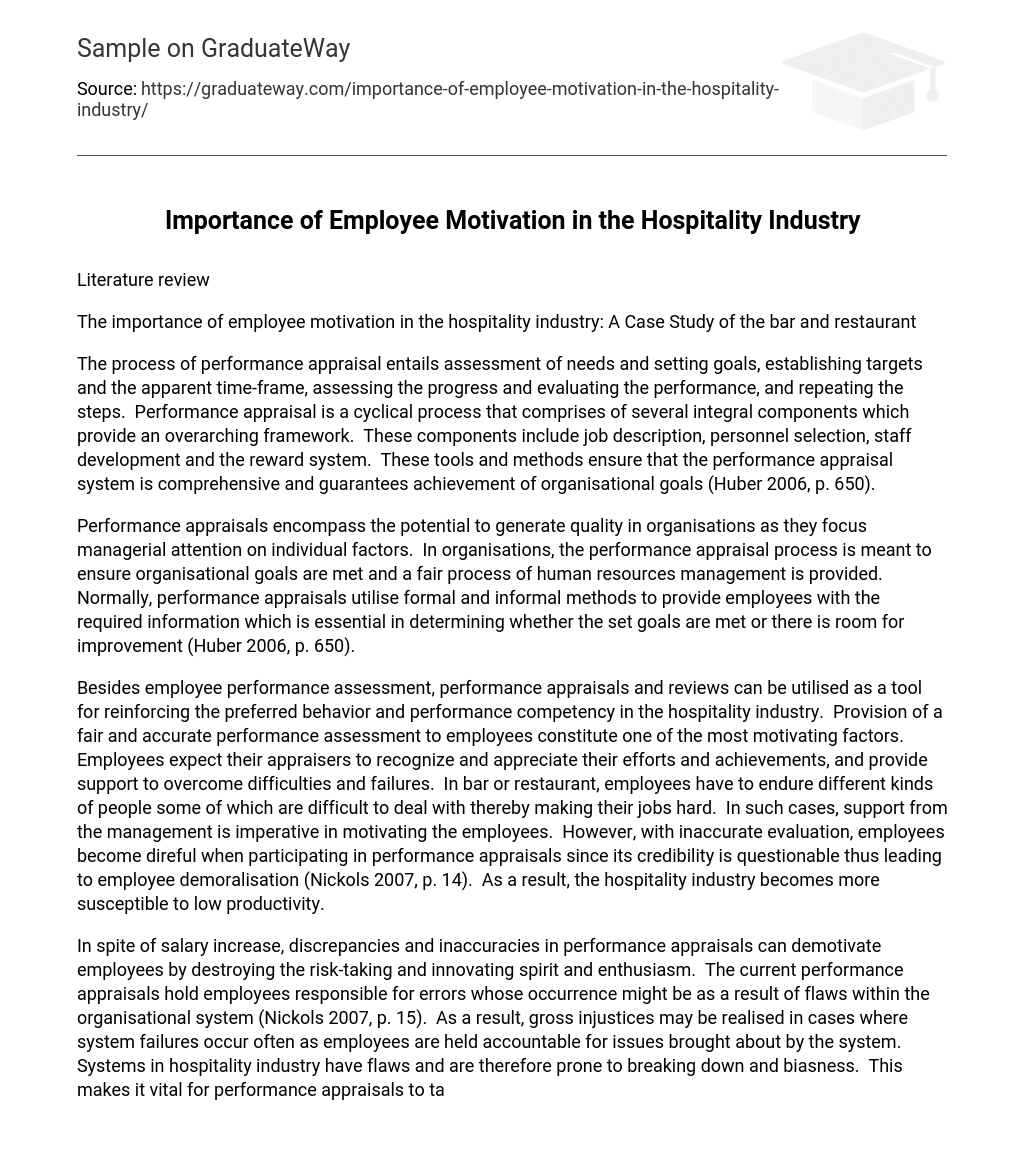Literature review
The importance of employee motivation in the hospitality industry: A Case Study of the bar and restaurant
The process of performance appraisal entails assessment of needs and setting goals, establishing targets and the apparent time-frame, assessing the progress and evaluating the performance, and repeating the steps. Performance appraisal is a cyclical process that comprises of several integral components which provide an overarching framework. These components include job description, personnel selection, staff development and the reward system. These tools and methods ensure that the performance appraisal system is comprehensive and guarantees achievement of organisational goals (Huber 2006, p. 650).
Performance appraisals encompass the potential to generate quality in organisations as they focus managerial attention on individual factors. In organisations, the performance appraisal process is meant to ensure organisational goals are met and a fair process of human resources management is provided. Normally, performance appraisals utilise formal and informal methods to provide employees with the required information which is essential in determining whether the set goals are met or there is room for improvement (Huber 2006, p. 650).
Besides employee performance assessment, performance appraisals and reviews can be utilised as a tool for reinforcing the preferred behavior and performance competency in the hospitality industry. Provision of a fair and accurate performance assessment to employees constitute one of the most motivating factors. Employees expect their appraisers to recognize and appreciate their efforts and achievements, and provide support to overcome difficulties and failures. In bar or restaurant, employees have to endure different kinds of people some of which are difficult to deal with thereby making their jobs hard. In such cases, support from the management is imperative in motivating the employees. However, with inaccurate evaluation, employees become direful when participating in performance appraisals since its credibility is questionable thus leading to employee demoralisation (Nickols 2007, p. 14). As a result, the hospitality industry becomes more susceptible to low productivity.
In spite of salary increase, discrepancies and inaccuracies in performance appraisals can demotivate employees by destroying the risk-taking and innovating spirit and enthusiasm. The current performance appraisals hold employees responsible for errors whose occurrence might be as a result of flaws within the organisational system (Nickols 2007, p. 15). As a result, gross injustices may be realised in cases where system failures occur often as employees are held accountable for issues brought about by the system. Systems in hospitality industry have flaws and are therefore prone to breaking down and biasness. This makes it vital for performance appraisals to take into account such issues in employee evaluation since they influence their performance.
The ability of an individual plays a crucial role in determining his or her level of performance. Ability comprises of mental and physical capacities that enable an individual to showcase a certain set of skills (Huber 2006, p. 651). An individual must have knowledge, experience and skills which constitute ability in order to complete a given task successful. As a result of ability being an innate capacity, individuals have different abilities and disparity is realised on their performance level regarding a particular task.
The job description part of performance appraisal specifies work standards and the skills, knowledge, and abilities which are deemed necessary for the job. Following job description is personnel selection in which individual capabilities are matched with key requirements for the job position (Huber 2006, p. 651). Ensuring high accuracy during personnel selection and provision of training to mold the abilities is the key to realisation of high performance by an employee. Moreover, motivation of such individuals also comes in handy since it influences the vigor and diligence in the application of the capabilities to perform a specified task.
Accurate and well designed performance appraisals have the potential to motivate employees as well as increase their job satisfaction in the hospitality industry. Individuals are different as they vary in terms of their capabilities hence will exhibit different skills and knowledge suitable for divergent tasks. Performance appraisals should have the ability to identify the skills and knowledge necessary for a particular task, select the most suitable individual and in addition to that, provide reward systems that motivate the employee.
Word count: 604
References
Huber, D 2006, Leadership and nursing care management, Elsevier Publishers, London.
Nickols, F 2007, “Performance appraisal,” Journal for Quality & Participation, Vol. 30, No. 1, pp. 13-16. Retrieved 3rd May, 2010 from EBSCO database.





